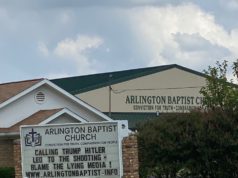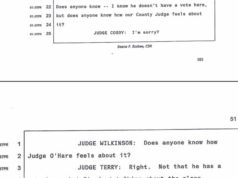For some reason, it’s always a dark and stormy night when the Fort Worth pro chapter of the Society of Professional Journalists hands out its awards. Maybe it’s because the local SPJ group created its First Amendment Awards during the Dubya era, when open-government protections and constitutional rights were falling faster than the president’ approval rating. In most years, the keynote speaker for the awards dinner would describe the latest horrors along those lines, while thunder and lightning (and one year, bad piano music bleeding over from another party) played in the background. Listening to those speeches was like going to a slasher movie about your own life – enthralling to be sure but also terrifying.
Last Friday night, the storms moved through before dinner was served at Arlington’s Cacharel Restaurant. Appropriately, keynote speaker Patrice McDermott, director of OpenTheGovernment.org, talked about how the dark clouds of official secrecy rolled away when Barack Obama became president. From his first full day in office, she said, Obama worked to repeal some of the most egregious directives of the Bush administration, such as the scurrilous Ashcroft memo, in which the former attorney general advised other federal officials to withhold records whenever there was a scintilla of a legal excuse for doing so.
Still, the dinner was no Obama smooch-fest. The new leadership in Washington is holding onto some vestiges of the questionable executive powers that its predecessors had claimed and used. Despite huge progress made in just the first few months of the new administration, the specifics of some White House proposals on things like release of public records is “less than thrilling in some areas,” McDermott said. Cue: a light rain, partly cloudy skies.
What does it mean? It means that the journalists and the librarians and legal scholars and all the folks worried about protecting open government and public records in this country still have work to do. For one thing, the Obama administration is asking for public input on an Open Government Directive that will set standards of transparency for the whole federal landscape. If you want to help make that change, go to McDermott’s group’s web site and watch for updates.
And closer to home: Keep supporting your local watchdog journalists. Like those at Fort Worth Weekly, who took home two First Amendment awards in the Texas-Oklahoma contest. Veteran Weekleteer Betty Brink won first prize in the “Reporting on Open Government” category for her stories on Tarrant County College’s construction boondoggles. And reporter Joaquin Sapien and data analyst Ben Welsh took top honors in the “Green News” category for their “Hear No Evil, Smell No Evil” story about the failures of TXU to correctly report numerous violations of clean-air standards in emissions from its power plants — and the failure of state agencies to do anything about those violations. That story was produced jointly by the Weekly and the nonprofit Center for Public Integrity, which was responsible for obtaining and analyzing millions of state and federal records that formed the story’s basis.
Other local winners included the Fort Worth Star-Telegram‘s Dave Lieber, who took first place in the “Defending the Disadvantaged” category. And North Texas college journalists, from Dallas to Tarleton to Fort Worth to Denton, dominated the student competition.
So. Quote of the day? “Eternal vigilance is the price of liberty.” Never stop asking. Keep on being a nuisance. Insist that the meetings and the records and the programs are the public’s business. No matter who’s in the White House or the mayor’s office or running for dogcatcher. Or, say, making up the rules on gas drilling.











